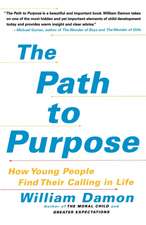Sign Me Up!: The Parents' Complete Guide to Sports, Activities, Music Lessons, Dance Classes, and Other Extracurriculars
Autor Stacy M. DeBroffen Limba Engleză Paperback – 31 iul 2003
Acclaimed parenting author Stacy M. DeBroff offers practical advice on dealing with the stressful phenomenon of extracurricular activity overload, helping you figure out:
- What kinds of activities best suit your child's personality
- What the best age is to start your
- child in an activity
- What the hidden costs and time commitments for each activity are
- How to deal with a bad sport, quitter, or superstar
- How many activities your child can really handle
A detailed breakdown of extracurricular activities from sports to music to troops and groups, itemizing the cost, equipment, time commitment, and opportunities for competition or performance, Sign Me Up! features personalized stories and tips from teachers, coaches, and parents from the MomCentral.com community. Comprehensive, concise, and user-friendly, Sign Me Up! is an indispensable reference you can turn to again and again.
Preț: 268.28 lei
Nou
Puncte Express: 402
Preț estimativ în valută:
51.34€ • 53.40$ • 42.39£
51.34€ • 53.40$ • 42.39£
Carte disponibilă
Livrare economică 24 martie-07 aprilie
Preluare comenzi: 021 569.72.76
Specificații
ISBN-13: 9780743235419
ISBN-10: 074323541X
Pagini: 672
Ilustrații: 100-150 2-c illustrations
Dimensiuni: 187 x 232 x 46 mm
Greutate: 1.19 kg
Ediția:Original
Editura: Free Press
Colecția Free Press
ISBN-10: 074323541X
Pagini: 672
Ilustrații: 100-150 2-c illustrations
Dimensiuni: 187 x 232 x 46 mm
Greutate: 1.19 kg
Ediția:Original
Editura: Free Press
Colecția Free Press
Notă biografică
Stacy M. DeBroff is author of The Mom Book and coauthor of Mom Central: The Ultimate Family Organizer. The ultimate insider for advice, tips, and information, Stacy has won the loyalty of moms across America. She is the founder and president of MomCentral.com, a premier website for moms, and publishes the monthly Mom Central newsletter. Prior to becoming a parenting author, Stacy founded and directed the Office of Public Interest as a lawyer at Harvard Law School from 1990 to 1998. The mother of two young children, Stacy lives in Chestnut Hill, Massachusetts.
Cuprins
Contents
Part I: Activity Mania
1 The Big Picture
The Demographics Say It All
Fear Underlying the Frenzy
Hard to Step Out of the Craze
Trickle-Down Theory: Children's Hectic Lives Reflect Our Own
What a Contrast to Our Childhood
Why the Activity Mania?
Impact of the Evolving Workforce and Working Moms • No One Home to Play With • It's Not Safe Out There • Cutbacks in Programs at Public Schools • Thinking Ahead to the Teenage Years
In a Culture of Overachievement, It's Hard to Keep Up with the Joneses
Parental Peer Pressure • Fear of Being an Inadequate Parent • The Push to Excel Starting in the Womb • Holding Your Child Back from Kindergarten
Looking Ahead: Thinking About College
Youth Sports and Activities Have Become Big Business
How This Book Can Help You Handle Activity Mania
2 How to Choose
Clarify What You Bring to the Table
Trying to Divine Your Child's Unique Potential • Wanting the Best for Your Child • Don't Relive Your Own Childhood • Your Child's Success as Reflected Glory on You • Valuing Your Child as a Human Being vs. a Human Doing • Back to the Basics: All About Having Fun
Deciding Among All the Tantalizing Possibilities
Think of Ages 4-10 as the Trial Years • Helping Your Child Find the Right Fit • Matching Activities to Your Child's Physique • The Role and Influence of Your Child's Friends • Pressure to Follow the "In-Crowd" • Fear Your Child Will Be Left Behind by Her Peers • How Young Is Too Young?
Who Does the Choosing?
Following Your Child's Lead • Prioritizing and Goal-Setting with Your Child • Insisting on Certain Non-Negotiable Activities
Limiting the Number of Simultaneous Activities
Your Child's Temperament and Energy Level • How Much Is Too Much? • Your Active Child Wants Even More Activities • Getting Your Resistant Child to Try Something New
Consider the Logistics
Using Your Family Calendar Strategically • Scheduling Strategies • Activity Bags and Equipment • Food, Drinks, and Snacks
Assessing an After-School Program
3 The Need for Downtime
The Value of Doing Nothing
Making Time for Unstructured Play
Dealing with Declarations of Boredom • How to Approach Downtime During Summer Months
Not Enough Downtime: Warning Signs of Stress and Burnout
Limiting TV and Electronics: Passivity Central
Establishing Family Rules • Computer and Electronic Games
Carving Out Time Together as a Family
The Erosion of the Family Dinner • Set Aside Family Time • Take Up Sports and Hobbies as a Family • Missing Games or Practices for Family Travel or Social Events • No Time for Religion • Preventing Family Burnout
Balancing Activities with Time for Homework
4 Ongoing Management
Sibling Strategies
Avoiding Comparisons Between Children • When Your Children Compete Head-to-Head • Twins or Multiples: Same Team? • Following in the Footsteps of a Sibling Star
Larger Families
Dealing with Your Child's Coach
Letting the Coaches Coach • Dealing with a Problematic Situation
Improving Your Skills as Spectator
Sideline Dos and Don'ts
5 Dealing with Difficult Issues
Supporting Your Child After a Game or Performance
What to Say After a Tough Loss • Keeping Winning in Perspective • Stress Effort, Not Performance • Don't Push Too Hard • Avoid Comparing Your Child to Her Peers
Dealing with a Bad Sport
When Your Child Wants to Quit
Uncover the Heart of the Matter • When Your Talented Child Wants to Quit • Dealing with Your Own Frustration
Addressing Reasons Your Child May Give for Quitting
Just Not having Fun • Feels Incompetent or Untalented • Feels Underchallenged or Bored • Struggling in the Opening Forays • Bad Fit with the Coach, Teacher, or Other Kids
Encouraging Your Child to Stick with It a While Longer
Making It a Family Policy Not to Quit
Times When Calling It Quits Makes Sense
The Process of Quitting Itself
Part II: Sports
6 General Sports Considerations
Ready for Organized Sports?
Specializing Early
Aiming for a College Scholarship to Defray Tuition • The Possibility of a Professional Sports Career • Starting Early Often Means Burning Out Early
Choosing Subjectively vs. Objectively Judged Sports
Team vs. Individual Sports
Recreational vs. Elite Teams
Recreational Teams • Playing Up with an Older Age Group • Travel, Select, or Elite Competitive Teams • Elite Team Tryouts
Bench Warming
What to Do When Your Child Hates Sports
Need for Physical Exercise: The Culture of Obesity
Obesity in Children: Why You Should Be Concerned • What's Causing the Increased Obesity? • Ways to Curtail Obesity in Your Child • Role Modeling: Be Physically Active Yourself
Considerations for Your Athletic Daughter
Title IX and Girls in Sports Today • Tips to Avoid Gender Stereotyping • Same-Sex vs. Coed Sports Teams • When Your Daughter Wants to Play on the Boys' Team • Girls Dropping Out of Sports Entirely Around Puberty
Sports for Your Special Needs Child
7 Choosing the Right Sport for Your Child
Kids Who Excel
General Sports Benefits
Physical Benefits of Exercise • Psychological and Emotional Benefits &3149; Social Benefits • Mental Benefits and Educational Success
Finding the Right Coach for Your Child
Volunteer Coaches • When You Have the Ability to Pick • Signs of Great Coaching • Telltale Signs of Poor Coaching
Evaluating a Teacher
Coaching Your Own Child
Making the Decision • Dealing with Other Parents
What to Look For in a Sports Program
Overall Safety and Injury Considerations
Proper Equipment • Preventing Heatstroke, Dehydration, and Frostbite • Overuse Injuries • Getting Ready for the Start of a New Season
Eating Disorders
Effects of Eating Disorders • What to Watch Out For • What to Do
Overall Cost Considerations
Budgeting Know-How • Buying Equipment • Ways to Save Money on Your Child's Sports Expenses
8 Guide to Specific Sports
9 Other Physical Activities
Strength Training
Yoga
10 Sports Resources
Part III: Art and Performing Arts
11 General Music Considerations
General Benefits
Encouraging Musical Interest in Your Child
Choosing a Musical Instrument
How to Choose • Physical Suitability, • Your Child's Preferences • It's Okay to Switch
Group Play in Orchestras and Bands
Renting vs. Buying an Instrument
General Cost Considerations • Types of Rental PlansInsurance • Rental vs. Purchase Cost
How to Choose a Music Teacher
Where Do I Begin the Search for a Teacher? • Interviewing a Prospective Teacher • Education and Involvement • Communicating with Your Child's Teacher
Getting Your Child to Practice
Creating the Ideal Practice Environment • Scheduling the Time • Making Practice Fun • Improving Technical Aspects and Measuring Progress
12 Guide to Specific Instruments
Piano
Brass and Woodwind
Bassoon • Clarinet • Flute • French Horn • Oboe • Recorder • Saxophone • Trombone • Trumpet • Tuba and Euphonium
Stringed Instruments
Cello • Double Bass • Guitar • Harp • Viola • Violin
Drums and Percussion Instruments
13 Voice Lessons and Group Singing
Overview
What to Expect in Voice Lessons
Why Your Child Doesn't Sound Perfect Yet • Helping with Practice • Helping Your Child Take Care of Her Voice
Chorus and Choir
What to Look for in a Voice Teacher 537 • Cost Considerations
14 Theater and the Performing Arts
Overview
Auditioning
Types of Performing Arts
Creative Drama and Improvisation (Improv) • Theater Arts • Musical Theater
15 Dance
Overview
Ballet
Other Popular Types of Dance
Ballroom Dancing • Hip-Hop • Irish Step Dancing • Jazz • Modern • Salsa/Latin Dance • Tap
16 Art
Overview
Popular Types of Art Class
Animation/Cartooning • Calligraphy • Ceramics, Pottery, and Wheel-Working • Painting and Drawing • Photography • Sculpture • Sewing, Quilting, and Needlework • Woodworking
17 Art and Performing Arts Resources
Music • Theatre • Dance • Art
Part IV: Intellectual and Community Activities
18 Intellectual
Chess
Foreign Language Study
Odyssey of the Mind
19 Troops and Groups
Girl Scouts
Boy Scouts
Camp Fire USA
4-H
20 Resources for Intellectual and Community Activities
Chess • Foreign Languages • Odyssey of The Mind • Troops and Groups
Part V: Conclusion
21 Final Thoughts
Remembering What Ultimately Counts
How Will This All Play Out? The Experimental Generation
What's to Be Done?
Selected Bibliography
Index
About the Author
Part I: Activity Mania
1 The Big Picture
The Demographics Say It All
Fear Underlying the Frenzy
Hard to Step Out of the Craze
Trickle-Down Theory: Children's Hectic Lives Reflect Our Own
What a Contrast to Our Childhood
Why the Activity Mania?
Impact of the Evolving Workforce and Working Moms • No One Home to Play With • It's Not Safe Out There • Cutbacks in Programs at Public Schools • Thinking Ahead to the Teenage Years
In a Culture of Overachievement, It's Hard to Keep Up with the Joneses
Parental Peer Pressure • Fear of Being an Inadequate Parent • The Push to Excel Starting in the Womb • Holding Your Child Back from Kindergarten
Looking Ahead: Thinking About College
Youth Sports and Activities Have Become Big Business
How This Book Can Help You Handle Activity Mania
2 How to Choose
Clarify What You Bring to the Table
Trying to Divine Your Child's Unique Potential • Wanting the Best for Your Child • Don't Relive Your Own Childhood • Your Child's Success as Reflected Glory on You • Valuing Your Child as a Human Being vs. a Human Doing • Back to the Basics: All About Having Fun
Deciding Among All the Tantalizing Possibilities
Think of Ages 4-10 as the Trial Years • Helping Your Child Find the Right Fit • Matching Activities to Your Child's Physique • The Role and Influence of Your Child's Friends • Pressure to Follow the "In-Crowd" • Fear Your Child Will Be Left Behind by Her Peers • How Young Is Too Young?
Who Does the Choosing?
Following Your Child's Lead • Prioritizing and Goal-Setting with Your Child • Insisting on Certain Non-Negotiable Activities
Limiting the Number of Simultaneous Activities
Your Child's Temperament and Energy Level • How Much Is Too Much? • Your Active Child Wants Even More Activities • Getting Your Resistant Child to Try Something New
Consider the Logistics
Using Your Family Calendar Strategically • Scheduling Strategies • Activity Bags and Equipment • Food, Drinks, and Snacks
Assessing an After-School Program
3 The Need for Downtime
The Value of Doing Nothing
Making Time for Unstructured Play
Dealing with Declarations of Boredom • How to Approach Downtime During Summer Months
Not Enough Downtime: Warning Signs of Stress and Burnout
Limiting TV and Electronics: Passivity Central
Establishing Family Rules • Computer and Electronic Games
Carving Out Time Together as a Family
The Erosion of the Family Dinner • Set Aside Family Time • Take Up Sports and Hobbies as a Family • Missing Games or Practices for Family Travel or Social Events • No Time for Religion • Preventing Family Burnout
Balancing Activities with Time for Homework
4 Ongoing Management
Sibling Strategies
Avoiding Comparisons Between Children • When Your Children Compete Head-to-Head • Twins or Multiples: Same Team? • Following in the Footsteps of a Sibling Star
Larger Families
Dealing with Your Child's Coach
Letting the Coaches Coach • Dealing with a Problematic Situation
Improving Your Skills as Spectator
Sideline Dos and Don'ts
5 Dealing with Difficult Issues
Supporting Your Child After a Game or Performance
What to Say After a Tough Loss • Keeping Winning in Perspective • Stress Effort, Not Performance • Don't Push Too Hard • Avoid Comparing Your Child to Her Peers
Dealing with a Bad Sport
When Your Child Wants to Quit
Uncover the Heart of the Matter • When Your Talented Child Wants to Quit • Dealing with Your Own Frustration
Addressing Reasons Your Child May Give for Quitting
Just Not having Fun • Feels Incompetent or Untalented • Feels Underchallenged or Bored • Struggling in the Opening Forays • Bad Fit with the Coach, Teacher, or Other Kids
Encouraging Your Child to Stick with It a While Longer
Making It a Family Policy Not to Quit
Times When Calling It Quits Makes Sense
The Process of Quitting Itself
Part II: Sports
6 General Sports Considerations
Ready for Organized Sports?
Specializing Early
Aiming for a College Scholarship to Defray Tuition • The Possibility of a Professional Sports Career • Starting Early Often Means Burning Out Early
Choosing Subjectively vs. Objectively Judged Sports
Team vs. Individual Sports
Recreational vs. Elite Teams
Recreational Teams • Playing Up with an Older Age Group • Travel, Select, or Elite Competitive Teams • Elite Team Tryouts
Bench Warming
What to Do When Your Child Hates Sports
Need for Physical Exercise: The Culture of Obesity
Obesity in Children: Why You Should Be Concerned • What's Causing the Increased Obesity? • Ways to Curtail Obesity in Your Child • Role Modeling: Be Physically Active Yourself
Considerations for Your Athletic Daughter
Title IX and Girls in Sports Today • Tips to Avoid Gender Stereotyping • Same-Sex vs. Coed Sports Teams • When Your Daughter Wants to Play on the Boys' Team • Girls Dropping Out of Sports Entirely Around Puberty
Sports for Your Special Needs Child
7 Choosing the Right Sport for Your Child
Kids Who Excel
General Sports Benefits
Physical Benefits of Exercise • Psychological and Emotional Benefits &3149; Social Benefits • Mental Benefits and Educational Success
Finding the Right Coach for Your Child
Volunteer Coaches • When You Have the Ability to Pick • Signs of Great Coaching • Telltale Signs of Poor Coaching
Evaluating a Teacher
Coaching Your Own Child
Making the Decision • Dealing with Other Parents
What to Look For in a Sports Program
Overall Safety and Injury Considerations
Proper Equipment • Preventing Heatstroke, Dehydration, and Frostbite • Overuse Injuries • Getting Ready for the Start of a New Season
Eating Disorders
Effects of Eating Disorders • What to Watch Out For • What to Do
Overall Cost Considerations
Budgeting Know-How • Buying Equipment • Ways to Save Money on Your Child's Sports Expenses
8 Guide to Specific Sports
9 Other Physical Activities
Strength Training
Yoga
10 Sports Resources
Part III: Art and Performing Arts
11 General Music Considerations
General Benefits
Encouraging Musical Interest in Your Child
Choosing a Musical Instrument
How to Choose • Physical Suitability, • Your Child's Preferences • It's Okay to Switch
Group Play in Orchestras and Bands
Renting vs. Buying an Instrument
General Cost Considerations • Types of Rental PlansInsurance • Rental vs. Purchase Cost
How to Choose a Music Teacher
Where Do I Begin the Search for a Teacher? • Interviewing a Prospective Teacher • Education and Involvement • Communicating with Your Child's Teacher
Getting Your Child to Practice
Creating the Ideal Practice Environment • Scheduling the Time • Making Practice Fun • Improving Technical Aspects and Measuring Progress
12 Guide to Specific Instruments
Piano
Brass and Woodwind
Bassoon • Clarinet • Flute • French Horn • Oboe • Recorder • Saxophone • Trombone • Trumpet • Tuba and Euphonium
Stringed Instruments
Cello • Double Bass • Guitar • Harp • Viola • Violin
Drums and Percussion Instruments
13 Voice Lessons and Group Singing
Overview
What to Expect in Voice Lessons
Why Your Child Doesn't Sound Perfect Yet • Helping with Practice • Helping Your Child Take Care of Her Voice
Chorus and Choir
What to Look for in a Voice Teacher 537 • Cost Considerations
14 Theater and the Performing Arts
Overview
Auditioning
Types of Performing Arts
Creative Drama and Improvisation (Improv) • Theater Arts • Musical Theater
15 Dance
Overview
Ballet
Other Popular Types of Dance
Ballroom Dancing • Hip-Hop • Irish Step Dancing • Jazz • Modern • Salsa/Latin Dance • Tap
16 Art
Overview
Popular Types of Art Class
Animation/Cartooning • Calligraphy • Ceramics, Pottery, and Wheel-Working • Painting and Drawing • Photography • Sculpture • Sewing, Quilting, and Needlework • Woodworking
17 Art and Performing Arts Resources
Music • Theatre • Dance • Art
Part IV: Intellectual and Community Activities
18 Intellectual
Chess
Foreign Language Study
Odyssey of the Mind
19 Troops and Groups
Girl Scouts
Boy Scouts
Camp Fire USA
4-H
20 Resources for Intellectual and Community Activities
Chess • Foreign Languages • Odyssey of The Mind • Troops and Groups
Part V: Conclusion
21 Final Thoughts
Remembering What Ultimately Counts
How Will This All Play Out? The Experimental Generation
What's to Be Done?
Selected Bibliography
Index
About the Author
Recenzii
Mimi Doe author of Busy but Balanced and founder of www.spiritualparenting.com In this frenetic day and age when most parents don't have time to brush their teeth, let alone figure out the best sports and activities for their kids, Stacy DeBroff is a parent's dream. Accessible, savvy, and concise, Sign Me Up! is one of the best tools out there for helping familes to create busy but balanced lives.
Brad Sachs, Ph.D. author of The Good Enough Child: How to Have an Imperfect Family and Be Perfectly Satisfied In this thorough, well-organized, and highly readable book, parents can learn how to create meaningful balance in their children's lives. Stacy DeBroff guides parents through the maze of extracurricular programs, provides them with solutions to predictable problems and dilemmas, and helps them establish reasonable expectations. Sign Me Up! is a comprehensive reference that every family will find to be relevant, reassuring, and immensely valuable.
Andrée Aelion Brooks author of the award-winning book Children of Fast Track Parents An indispensable guide for today's busy parents eager to understand the pros and cons of the profusion of extracurricular activities that are overwhelming our children's lives.
Kathy Peel author of The Family Manager Takes Charge: Getting on the Fast Track to a Happy, Organized Home Full of hands-on, practical tips, this book helps parents discover which activities are in harmony with their child's unique personality and talents. A wonderful resource that helps reduce fretting and frustration in every family.
Brad Sachs, Ph.D. author of The Good Enough Child: How to Have an Imperfect Family and Be Perfectly Satisfied In this thorough, well-organized, and highly readable book, parents can learn how to create meaningful balance in their children's lives. Stacy DeBroff guides parents through the maze of extracurricular programs, provides them with solutions to predictable problems and dilemmas, and helps them establish reasonable expectations. Sign Me Up! is a comprehensive reference that every family will find to be relevant, reassuring, and immensely valuable.
Andrée Aelion Brooks author of the award-winning book Children of Fast Track Parents An indispensable guide for today's busy parents eager to understand the pros and cons of the profusion of extracurricular activities that are overwhelming our children's lives.
Kathy Peel author of The Family Manager Takes Charge: Getting on the Fast Track to a Happy, Organized Home Full of hands-on, practical tips, this book helps parents discover which activities are in harmony with their child's unique personality and talents. A wonderful resource that helps reduce fretting and frustration in every family.
Descriere
The book provides a detailed breakdown of hundreds of extracurricular activities, itemizing the cost, equipment, time commitment, opportunities for competition, and even the philosophies underlying each activity.






